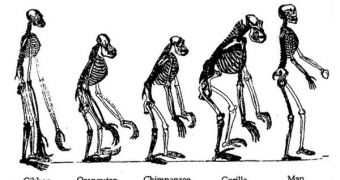Until 10,000 years ago, when humankind invented agriculture, evolution took our ancestors on an uninterrupted journey from primates to two-legged creatures. Once people started cultivating the land, and the hunter-gatherer society disappeared, the natural course of evolution was disrupted, with yet-undetermined consequences, anthropologists say. Over the course of millions of years, out bodies were optimized for the previous type of society, and such a drastic change, which occurred only over several centuries, came as a “break” from that path.
Anthropology professor Daniel Lieberman has recently stated during a Harvard Museum of Natural History (HMNH) conference, entitled Survival of the Fleetest, Smartest or Fattest?, that the final stage in the development of our species, Homo sapiens, from an ancestor that we shared in common with other Homo species, is not the result of an evolutionary phase, but of an artificial one. The very inception of agriculture has been enough to reshape the way humans around the globe live and to create societies whose structure has endured to this day.
Lieberman proposes that cultural factors are responsible for the modern rampant surge in diseases such as diabetes and obesity, which were probably not even heard of 10 millennia ago. But because we have made life for us simple, and because we no longer have to compete in order to get what we want, our lifestyles have become so different from those of our ancestors, that such conditions have finally met a favorable environment in which to appear.
Other than giving individuals a constant source of food, agriculture has also played a major role in the appearance and development of some of the oldest diseases in history, such as tuberculosis, which has been found in some 9,000-year-old human remains. Because our ancestors spent a lot of time in the same place, living spaces became spots where viruses and bacteria could thrive. And the presence of so many animals, as in chickens, goats, and, later, horses, only favored this situation.
A steady place to live in also meant that women gave birth more often, which contributed to a drastic rise in population and, thus, the necessity to reorganize the society into more defined structures of command. Trade flourished, and, with it, diseases were carried to areas they couldn't have reached otherwise.
“We need to think more like Darwin and act more like hunter-gatherers,” the scientist opines. Potential solutions involve asking more physical activity of ourselves, instead of vegetating in front of the TV whenever we have a spare moment, increased gasoline taxes, so that people would drive less and walk more, and the outlawing of fast food, which is one of the main sources of disease in the modern world. Still, because individuals are used to being left alone, they are very likely to follow these sound pieces of advice, and therefore the current trend in diseases and mentalities will most likely continue to develop.

 14 DAY TRIAL //
14 DAY TRIAL //